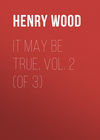Czytaj książkę: «A Life's Secret», strona 10
CHAPTER IV.
AGITATION
The men of an influential metropolitan building firm had struck, because their employers declined to accede to certain demands, and Daffodil's Delight was, as you have seen, in a high state of excitement, particularly the female part of it. The men said they struck for a diminution in the hours of labour; the masters told them they struck for an increase of wages. Seeing that the non-contents wanted the hours reduced and not the pay, it appears to me that you may call it which you like.
The Messrs. Hunters' men—with whom we have to do, for it was they who chiefly filled Daffodil's Delight—though continuing their work as usual, were in a most unsettled state; as was the case in the trade generally. The smouldering discontent might have died away peacefully enough, and probably would, but that certain spirits made it their business to fan it into a flame.
A few days went on. One evening Sam Shuck posted himself in an angle formed by the wall at the top of Daffodil's Delight. It was the hour for the men to quit work; and, as they severally passed him on their road home, Sam's arm was thrust forward, and a folded bit of paper put into their hands. A mysterious sort of missive apparently; for, on opening the paper, it was found to contain only these words, in the long, sprawling hand of Sam himself: 'Barn at the back of Jim Dunn's. Seven o'clock.'
Behind the house tenanted by the Dunns were premises occupied until recently by a cowkeeper. They comprised, amidst other accommodation, a large barn, or shed. Being at present empty, and to let, Sam thought he could do no better than take French leave to make use of it.
The men hurried over their tea, or supper (some took one on leaving work for the night, some the other, some a mixture of both, and some neither), that they might attend to the invitation of Sam. Peter Quale was seated over a substantial dish of batter pudding, a bit of neck of mutton baked in the midst of it, when he was interrupted by the entrance of John Baxendale, who had stepped in from his own rooms next door.
'Be you a going to this meeting, Quale?' Baxendale asked, as he took a seat.
'I don't know nothing about it,' returned Peter. 'I saw Slippery Sam a giving out papers, so I guessed there was something in the wind. He took care to pass me over. I expect I'm the greatest eyesore Sam has got just now. Have a bit?' added Peter, unceremoniously, pointing to the dish before him with his knife.
'No, thank ye; I have just had tea at home. That's the paper'—laying it open on the table-cloth. 'Sam Shuck is just now cock-a-hoop with this strike.'
'He is no more cock-a-hoop than the rest of Daffodil's Delight is,' struck in Mrs. Quale, who had finished her own meal, and was at leisure to talk. 'The men and women is all a going mad together, I think, and Slippery Sam's leading 'em on. Suppose you all do strike—which is what they are hankering after—what good 'll it bring?'
'That's just it,' replied Baxendale. 'One can't see one's way clear. The agitation might do us some good, but it might do us a deal of harm; so that one doesn't know what to be at. Quale, I'll go to the meeting, if you will?'
'If I go, it will be to give 'em a piece of my mind,' retorted Peter.
'Well, it's only right that different sides should be heard. Sam 'll have it all his own way else.'
'He'll manage to get that, by the appearance things wears,' said Mrs. Quale, wrathfully. 'How you men can submit to be led by such a fellow as him, just because his tongue is capable of persuading you that black's white, is a marvel to me. Talk of women being soft! let the men talk of theirselves. Hold up a finger to 'em, and they'll go after it: like the Swiss cows Peter read of the other day, a flocking in a line after their leader, behind each other's tails.'
'I wish I knew what was right,' said Baxendale, 'or which course would turn out best for us.'
'I'd be off and listen to what's going on, at any rate,' urged Mrs. Quale.
The barn was filling. Sam Shuck, perched upon Mrs. Dunn's washing-tub turned upside down, which had been rolled in for the occasion, greeted each group as it arrived with a gracious nod. Sam appeared to be progressing in the benefits he had boasted to his wife he should derive, inasmuch as that the dilapidated clothes had been discarded for better ones: and he stood on the tub's end in all the glory of a black frock coat, a crimson neck-tie with lace ends, and peg-top pantaloons: the only attire (as a ready-made outfitting shop had assured him) that a gentleman could wear. Sam's eye grew less complacent when it rested on Peter Quale, who was coming in with John Baxendale.
'This is a pleasure we didn't expect,' said he.
'Maybe not,' returned Peter Quale, drily. 'The barn's open to all.'
'Of course it is,' glibly said Sam, putting a good face upon the matter. 'All fair and above board, is our mottor: which is more than them native enemies of ours, the masters, can say: they hold their meetings in secret, with closed doors.'
'Not in secret—do they?' asked Robert Darby. 'I have not heard of that.'
'They meet in their own homes, and they shut out strangers,' replied Sam. 'I'd like to know what you call that, but meeting in secret?'
'I should not call it secret; I should call it private,' decided Darby, after a minute's pause, given to realize the question. 'We might do the same. Our homes are ours, and we can shut out whom we please.'
'Of course we might,' contended Sam. 'But we like better to be open; and if a few of us assemble together to consult on the present aspect of affairs, we do it so that the masters, if they choose, might come and hear us. Things are not equalized in this world. Let us attempt secret meetings, and see how soon we should be looked up by the law, and accused of hatching treason and sedition, and all the rest of it. That sharp-eyed Times newspaper would be the first to set on us. There's one law for the masters, and another for the men.'
'Is that Slippery Sam?' ejaculated a new comer, at this juncture. 'Where did you get that fine new toggery, Shuck?'
The disrespectful interruption was spoken in simple surprise: no insidious meaning prompting it. Sam Shuck had appeared in ragged attire so long, that the change could not fail to be remarkable. Sam loftily turned a deaf ear to the remark, and continued his address.
'I am sure that most of you can't fail to see that things have come to a crisis in our trade. The moment that brought it, was when that great building firm refused the reasonable demands of their men; and the natural consequence of which was a strike. Friends, I have been just riled ever since. I have watched you go to work day after day like tame cats, the same as if nothing had happened; and I have said to myself: "Have those men of Hunter's got souls within them, or have they got none?"'
'I don't suppose we have parted from our souls,' struck in a voice.
'You have parted with the feelings of them, at any rate,' rejoined Sam, beginning to dance in the excitement of contention, but remembering in time that his terra firma was only a creaky tub. 'What's that you ask me? How have you parted with them? Why, by not following up the strike. If you possessed a grain of the independence of free men, you'd have hoisted your colours before now; what would have been the result? Why, the men of other firms in the trade would have followed suit, and all struck in a body. It's the only way that will bring the masters to reason: the only way by which we can hope to obtain our rights.'
'You see there's no knowing what would be the end of a strike, Shuck,' argued John Baxendale.
'There's no knowing what may be the inside of a pie until you cut him open,' said Jim Dunn, whose politics were the same as Mr. Shuck's, red-hot for a strike. 'But 'tain't many as 'ud shrink from putting in the knife to see.'
The men laughed, and greeted Jim Dunn with applause.
'I put it to you all,' resumed Sam, who took his share of laughing with the rest, 'whether there's sense or not in what I say. Are we likely to get our grievances redressed by the masters, unless we force it? Never: not if we prayed our hearts out.'
'Never,' and 'never,' murmured sundry voices.
'What are our grievances?' demanded Peter Quale, putting the question in a matter-of-fact tone, as if he really asked for information.
'Listen!' ironically ejaculated Sam. 'He asks what our grievances are! I'll answer you, Quale. They are many and great. Are we not kept to work like beasts of burden, ten hours a day? Does that leave us time for the recreation of our wearied bodies, for the improvement of our minds, for the education of our children, for the social home intercourse in the bosoms of our families? By docking the day's labour to nine hours—or to eight, which we shall get, may be, after awhile,' added Sam, with a wink—'it would leave us the extra hour, and be a blessing.'
Sam carried the admiring room with him. That hard, disbelieving Peter Quale, interrupted the cheering.
'A blessing, or the conterairy, as it might turn out,' cried he. 'It's easy to talk of education, and self-improvement; but how many is there that would use the accorded hour that way?'
'Another grievance is our wages,' resumed Sam, drowning the words, not caring to court discussion on what might be a weak point. 'We call ourselves men, and Englishmen, and yet we lie down contented with five-and-sixpence a day. Do you know what our trade gets in Australia? Oh, you do, some of you? then I'll tell those that don't. From twelve to fifteen shillings per day: and even more than that. Twelve shillings! and that's the minimum rate of pay,' slowly repeated Sam, lifting up his arm and one peg-top to give emphasis to the words.
A murmur of envy at the coveted rate of pay in Australia shook the room to the centre.
'But the price of provisions and other necessaries is enormous in that quarter,' debated Abel White. 'So it may come to the same in the end—be about as broad as long. Old father and me was talking about it last night.'
'If everybody went in for your old father's sentiments, we should soon be like him—in our dotage,' loftily observed Sam.
'But things are dear there,' persisted Sam's antagonist. 'I have heard what is sometimes given for shoes there; but I'm afraid to say, it was so much. The wages in Australia can't be any guide for us.'
'No, they can't,' said Peter Quale. 'Australia is one place, and this is another. Where's the use of bringing up that?'
'Oh, of course not,' sarcastically uttered Sam. 'Anything that tends to show how we are put upon, and how we might be made more comfortable, it's of no use bringing up. The long and the short of it is this: we want to be regarded as MEN: to have our voices considered, and our plaints attended to; to be put altogether upon a better footing. Little enough is it we ask at present: only for a modicum of ease in our day's hard labour, just the thin end of the wedge inserted to give it. That's all we are agitating for. It depends upon ourselves whether we get it or not. Let us display manly courage and join the strike, and it is ours to-morrow.'
The response did not come so quickly as Sam deemed it ought. He went on in a persuasive, ringing tone.
'Consider the wives of your bosoms; consider your little children; consider yourselves. Were you born into the world to be slaves—blackymoors; to be ground into the dust with toil? Never.'
'Never,' uproariously echoed three parts of the room.
'The motto of a true man is, or ought to be, "Do as little as you can, and get as much for it;"' said Sam, dancing in his enthusiasm, and thereby nearly losing his perch on the tub. 'With an hour's work less a day, and the afternoon holiday on the Saturday, we shall–'
'What's the good of a afternoon Saturday holiday? We don't want that, Sam Shuck.'
This ignominious interruption to the proceedings came from a lady. Buzzing round the entrance door and thrusting in their heads at a square hole, which might originally have been intended for a window were a dozen or two of the gentler sex. This irregularity had not been unobserved by the chairman, who faced them: the chairman's audience, densely packed, had their backs that way. It was not an orthodox adjunct to a trade meeting, that was certain, and the chairman would probably have ordered the ladies away, had he deemed there was a chance of his getting obeyed; but too many of them had the reputation of being the grey mares. So he winked at the irregularity, and had added one or two flourishes of oratory for their especial ears. The interruption came from Mrs. Cheek, Timothy Cheek's wife.
'What's the good of a afternoon Saturday holiday? We don't want that, Sam Shuck. Just when we be up to our eyes in muck and cleaning, our places routed out till you can't see the colour of the boards, for brooms, and pails, and soap and water, and the chairs and things is all topsy-turvy, one upon another, so as the children have to be sent out to grub in the gutter, for there ain't no place for 'em indoors, do you think we want the men poking their noses in? No; and they'd better not try it on. Women have got tempers given to 'em as well as you.'
'And tongues too,' rejoined Sam, unmindful of the dignity of his office.
'It is to be hoped they have,' retorted Mrs. Cheek, not inclined to be put down; and her sentiments appeared to be warmly joined in by the ladies generally. 'Don't you men go a agitating for the Saturday's half-holiday! What 'ud you do with it, do you suppose? Why, just sot it away at the publics.'
Some confusion ensued; and the women were peremptorily ordered to mind their own business, and 'make theirselves scarce,' which not one of them attempted to obey. When the commotion had subsided, a very respectable man took up the discourse—George Stevens.
'The gist of the whole question is this,' he said: 'Will agitation do us good, or will it do us harm? We look upon ourselves as representing one interest; the masters consider they represent another. If it comes to open warfare between the two, the strongest would win.'
'In other words, whichever side's funds held out the longest,' said Robert Darby. 'That is as I look upon it.'
'Just so,' returned Stevens. 'I cannot say, seeing no farther than we can see at present, that a strike would be advisable.'
'Stevens, do you want to better yourself, or not?' asked Sam Shuck.
'I'd be glad enough to better myself, if I saw my way clear to do it,' was the reply. 'But I don't.'
'We don't want no strikes,' struck in a shock-headed hard-working man. 'What is it we want to strike for? We have got plenty of work, and full wages. A strike won't fill our pockets. Them may vote for strikes that like 'em; I'll keep to my work.'
Partial applause.
'It is as I said,' cried Sam. 'There's poor, mean-spirited creatures among you, as won't risk the loss of a day's pay for the common good, or put out a hand to help the less fortunate. I'd rather be buried alive, five feet under the earth, than I'd show cat so selfish.'
'What is the interest of one of us is the interest of all,' observed Stevens. 'And a strike, if we went into it, would either benefit us all in the end, or make us all suffer. It is sheer nonsense to attempt to make out that one man's interest is different from another's; our interests are the same. I'd vote for striking to-morrow, if I were sure we should come out of it with whole skins, and get what we struck for: but I must see that a bit clearer first.'
'How can we get it, unless we try for it?' demanded Sam. 'If the masters find we're all determined, they'll give in to us. I appeal to you all'—raising his hands over the room—'whether the masters can do without us?'
'That has got to be seen,' said Peter Quale, significantly. 'One thing is plain: we could not do without them.'
'Nor they without us—nor they without us,' struck in voices from various parts of the barn.
'Then why shilly-shally about the question of a strike?' asked Sam of the barn, in a glib tone of reason. 'If a universal strike were on, the masters would pretty soon make terms that would end it. Why, a six months' strike would drive half of them into the Gazette——'
'But it might drive us into the workhouse at the same time,' interrupted John Baxendale.
'Let me finish,' went on Sam; 'it's not perlite to take up a man in the middle of a sentence. I say that a six months' strike would send many of the masters to the bankruptcy court. Well now, there has been a question debated among us'—Sam lowered his voice—'whether it would not be policy to let things go on quietly, as they are, till next spring–'
'A question among who?' interposed Peter Quale, regardless of the reproof just administered to John Baxendale.
'Never you mind who,' returned Sam, with a wink: 'among those that are hard at work for your interest. With their contracts for the season signed, and their works in full progress, say about next May, then would be the time for a strike to tell upon the masters. However, it has been thought better not to delay it. The future's but an uncertainty: the present is ours, and so must the strike be. Have you wives?' he pathetically continued; 'have you children? have you spirits of your own? Then you will all, with one accord, go in for the strike.'
'But what are our wives and children to do while the strike is on?' asked Robert Darby. 'You say yourself it might last six months, Shuck. Who would support them?'
'Who!' rejoined Sam, with an indignant air, as if the question were a superfluous one. 'Why the Trades' Unions, of course. That's all settled. The Unions are prepared to take care of all who are out on strike, standing up, like brave Britons, for their privileges, and keep 'em like fighting-cocks. Hooroar for that blessed boon, the Trades' Unions!'
'Hooroar for the Trades' Unions!' was shouted in chorus. 'Keep us like fighting-cocks, will they! Hooroar!'
'Much good you'll get from the Trades' Unions!' burst forth a dissentient voice. 'They are the greatest pests as ever was allowed in a free country.'
The opposition caused no little commotion. Standing by the door, having pushed his way through the surrounding women, who had not made themselves 'scarce,' was a man in a flannel jacket, a cap in his hand, and his head white with mortar. He was looking excited as he spoke.
'This is not regular,' said Sam Shuck, displaying authority. 'You have no business here: you don't belong to us.'
'Regular or irregular, I'll speak my mind,' was the answer. 'I have been at work for Jones the builder, down yonder. I have done my work steady and proper, and I have had my pay. A man comes up to me yesterday and says, "You must join the Trades' Union." "No," says I, "I shan't; I don't want nothing of the Trades' Union, and the Union don't want nothing of me." So they goes to my master. "If you keep on employing this man, your other men will strike," they says to him; and he, being in a small way, got intimidated, and sent me off to-day. And here I am, throwed out of work, and I have got a sick wife and nine young children to keep. Is that justice? or is it tyranny? Talk about emancipating the slaves! let us emancipate ourselves at home.'
'Why don't you join the Union?' cried Sam. 'All do, who are good men and true.'
'All good men and true don't,' dissented the man. 'Many of the best workmen among us won't have anything to do with Unions; and you know it, Sam Shuck.'
'Just clear out of this,' said Sam.
'When I've had my say,' returned the man, 'not before. If I would join the Union, I can't. To join it, I must pay five shillings, and I have not got them to pay. With such a family as mine, you may guess every shilling is forestalled afore it comes in. I kept myself to myself, doing my work in quiet, and interfering with nobody. Why should they interfere with me?'
'If you have been in full work, five shillings is not much to pay to the Union,' sneered Sam.
'If I had my pockets filled with five-shilling pieces, I would not pay one to it,' fearlessly retorted the man. 'Is it right that a free-born Englishman should give in to such a system of intimidation? No: I never will. You talk of the masters being tyrants: it's you who are the tyrants, one to another. What is one workman better than his fellow, that he should lay down laws and say, You shall do this, and you shall do that, or you shan't be allowed to work at all? That rule you want to get passed—that a skilled, thorough workman shouldn't do a full day's work because some of his fellows can't—who's agitating for it? Why, naturally those that can't or won't do the full work. Would an honest, capable man go in for it? Of course he'd not. I tell you what'—turning his eyes on the room—'the Trades' Unions have been called a protection to the working man; but, if you don't take care, they'll grow into a curse. When Sam Shuck, and other good-for-naughts like him, what never did a full week's work for their families yet, are paid in gold and silver to spread incendiarism among you, it's time you looked to yourselves.'
He turned away as he spoke; and Sam, in a dance of furious passion, danced off his tub. The interlude had not tended to increase the feeling of the men in Sam's favour—that is, in the cause he advocated. Not a man present but wanted to better himself could he do so with safety, but they were afraid to enter on aggressive measures. Indiscriminate talking ensued; diverse opinions were disputed, and the meeting was prolonged to a late hour. Finally the men dispersed as they came, nothing having been resolved upon. A few set their faces resolutely against the proposed strike; a few were red-hot for it; but the majority were undecided, and liable to be swayed either way.
'It will come,' nodded Sam Shuck, as he went home to a supper of pork chops and gin-and-water.
But Sam was destined to be—as he would have expressed it—circumvented. It cannot be supposed that this unsatisfactory state of things was unnoticed by the masters: and they took their measures accordingly. Forming themselves into an association, they discussed the measures best to be adopted, and determined upon a lock-out; that is, to close their yards until the firm, whose workmen had struck, should resume work. They also resolved to employ only those men who would sign an agreement, or memorandum, affirming that they were not connected with any society which interfered with the arrangements of the master whose service they entered, or with the hours of labour, and acknowledging the rights both of masters and men to enter into any trade arrangements on which they might mutually agree. This paper of agreement was not relished by the men at all; they styled it 'the odious document.' Neither was the lock-out relished: it was of course equivalent, in one sense, to a strike; only that the initiative had come from the masters' side, and not from theirs. It commenced early in August. Some of the masters closed their works without a word of explanation to their men: in one sense it was not needed, for the men knew of the measure beforehand. Mr. Hunter chose to assemble them together, and state what he was about to do. Somewhat of his old energy appeared to have been restored to him for the moment, as he stood before them and spoke—Austin Clay by his side.
'You have brought it upon yourselves,' he said, in answer to a remark from one who boldly, but respectfully, asked whether it was fair to resort to a lock-out, and so punish all alike, contents and non-contents. 'I will meet the question upon your own grounds. When the Messrs. Pollocks' men struck because their demands, to work nine hours a day, were not acceded to, was it not in contemplation that you should join them—that the strike should be universal? Come, answer me candidly.'
The men, true and honest, did not deny it.
'And possibly by this time you would have struck,' said Mr. Hunter. 'How much more "fair" would that have been towards us, than this locking-out is towards you? Do you suppose that you alone are to meet and pass your laws, saying you will coerce the masters, and that the masters will not pass laws in return? Nonsense, my men!'
A pause.
'When have the masters attempted to interfere with your privileges, either by saying that your day's toil shall consist of longer hours, or by diminishing your wages, and threatening to turn you off if you do not fall in with the alteration? Never. Masters have rights as well as men; but some of you, of late, have appeared to ignore the fact. Let me ask you another question: Were you well treated under me, or were you not? Have I shown myself solicitous for your interests, for your welfare? Have I ever oppressed you, ever put upon you?'
No, Mr. Hunter had never sought to oppress them: they acknowledged it freely. He had ever been a good master.
'My men, let me give you my opinion. While condemning your conduct, your semblance of discontent—it has been semblance rather than reality—I have been sorry for you, for it is not with you that the chief blame lies. You have suffered evil persuaders to get access to your ears, and have been led away by their pernicious counsels. The root of the evil lies there. I wish you could bring your own good sense to bear upon these points, and to see with your own eyes. If so, there will be nothing to prevent our resuming together amicable relations; and, for my own part, I care not how soon the time shall come. The works are for the present closed.



















